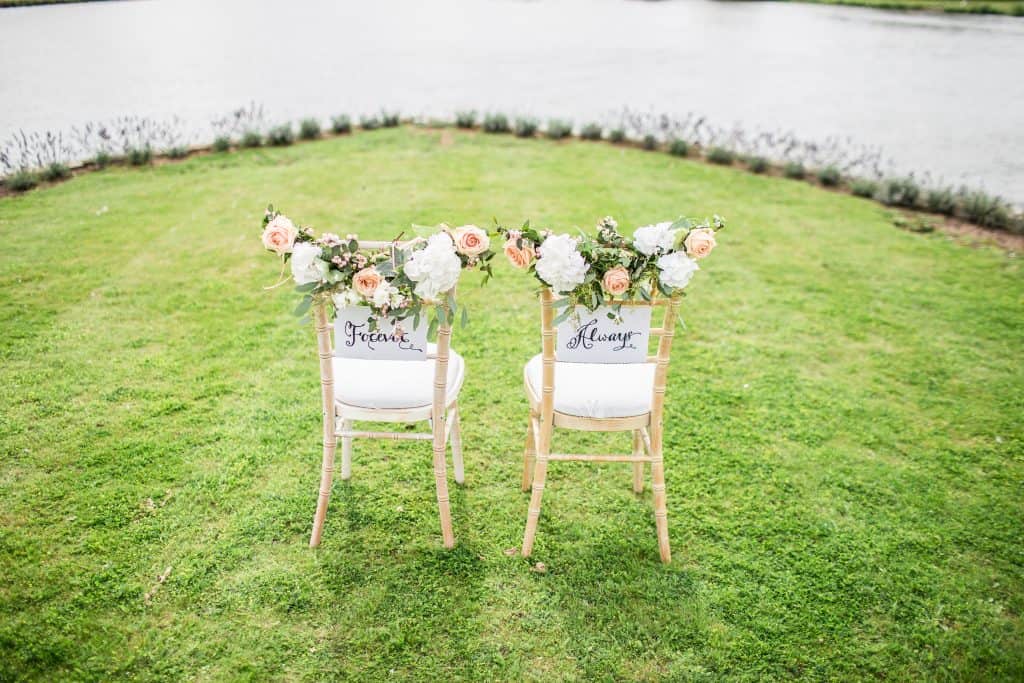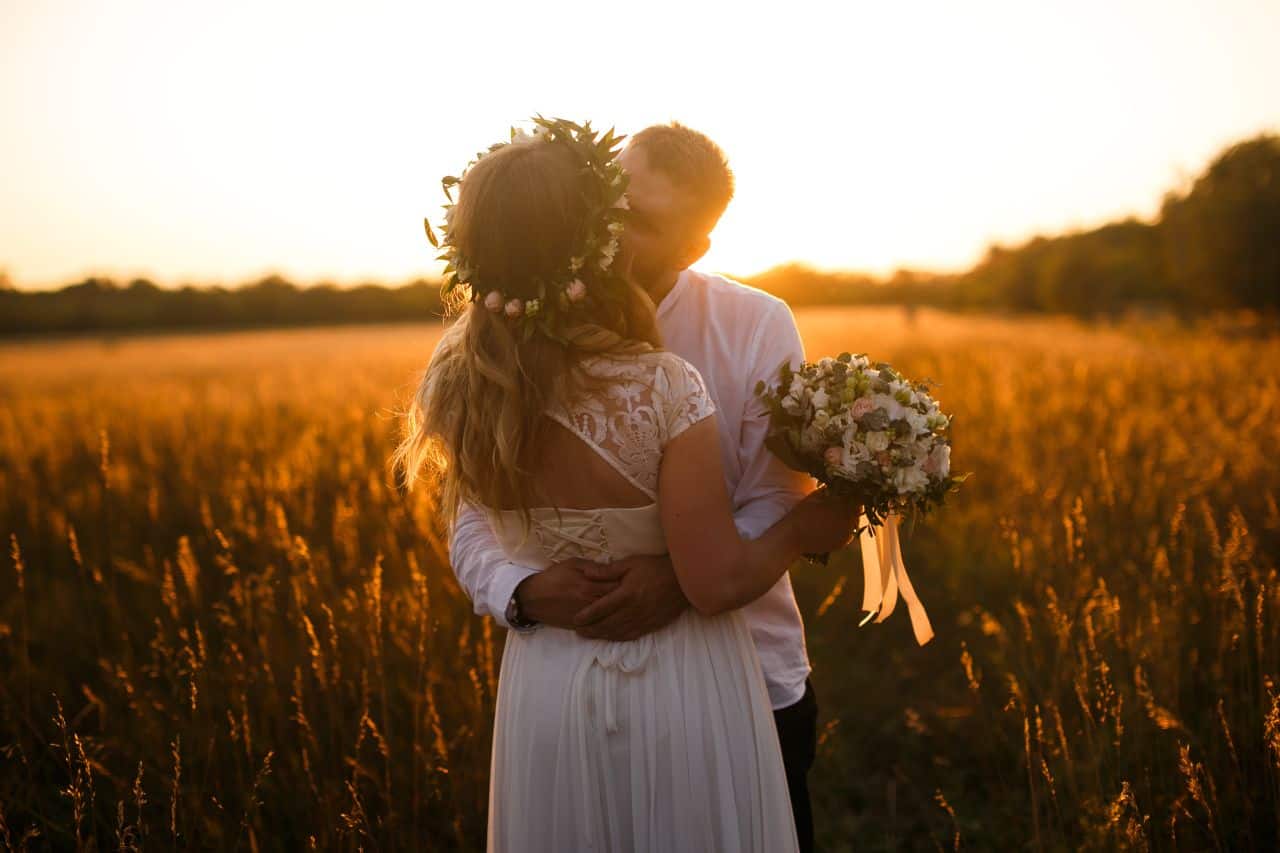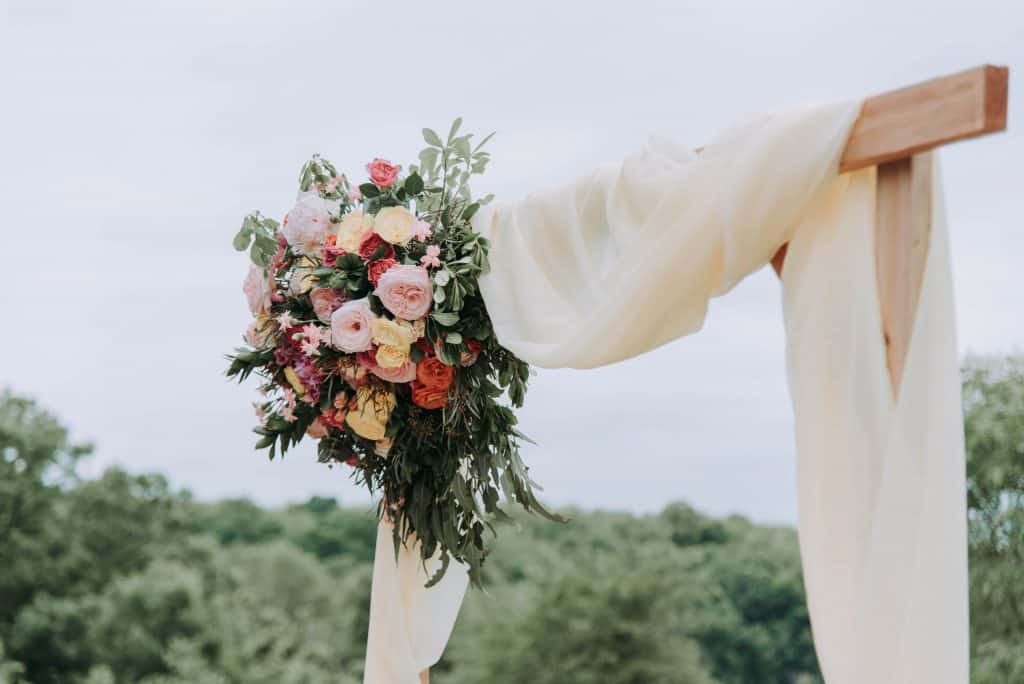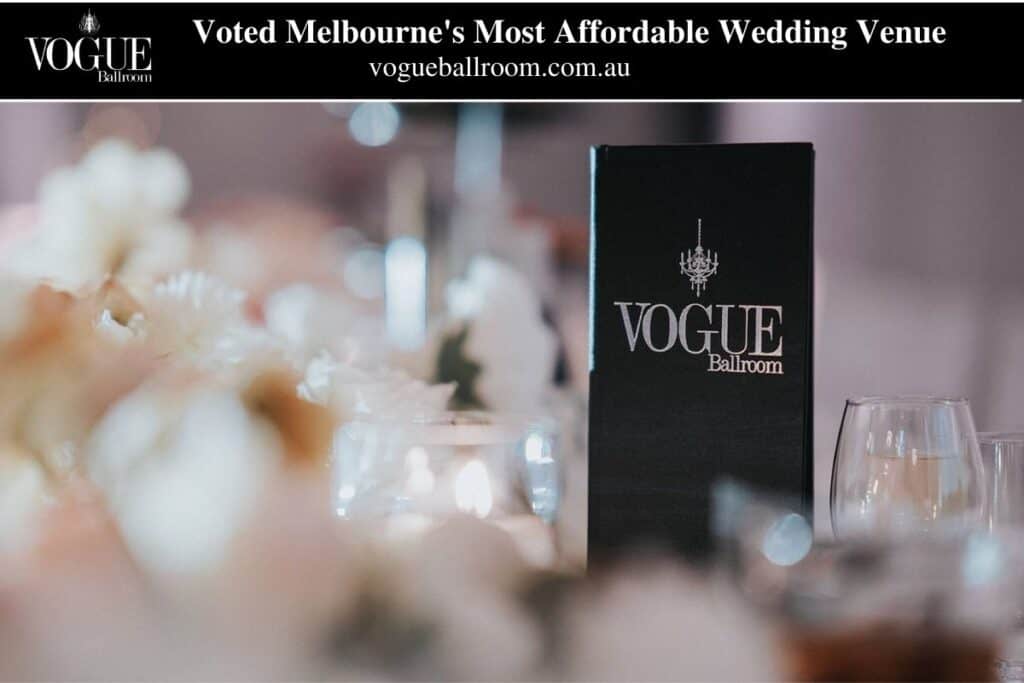Traditional Jewish weddings are rich with meaning and emotion, but also in the joy of the couple's new life together. You may not know what to expect from a Jewish wedding or its reception if you've never been to one before. We consulted with Jewish wedding officiants and specialists to provide light on the significance of many customs fundamental to Jewish nuptials. To ensure that all of our guests are comfortable and well-informed during the ceremony, we have compiled a list of Jewish wedding traditions and explanations of their significance.
Listed here are the dos and don'ts for attending a Jewish wedding in the traditional sense. We hope this material is helpful in answering questions and giving our guests the context they'll need to follow and appreciate our wedding ceremony.
Looking for the Best Wedding Venue in Melbourne? Vines of the Yarra Valley is Melbourne's Iconic.
Table of Contents
Ketubah (Jewish Marriage Document)
If you're invited to a Jewish wedding, you should know that the rituals you'll witness will vary depending on whether the couple practises Orthodox, Conservative, or Reform Judaism. A Ketubah, or Jewish marriage contract, is signed by the bride and groom prior to the start of the ceremony in almost all Jewish marriages. During the ceremony, the Ketubah is traditionally given to the bride and groom.
The Ketubah was created to safeguard the wife by outlining his responsibilities to her and assuring her of a financial settlement in the event of a divorce. Ketubot (plural) have, through the centuries, been illuminated and calligraphed to become significant works of Jewish art. Nowadays, there are a wide variety of equitable Ketubot available. There are many who put less emphasis on the practical and more on the spiritual components of a partnership. Some people agree with the rabbis that it's important to focus on reality, but they disagree on how to define each spouse's responsibilities.
The Ketubah will be recited and witnessed by close friends and family members at a private ceremony before the wedding. This is not a marriage licence, but rather a spiritual commitment that we have sworn to one other and will keep hanging in our home as a constant reminder of our undying love and devotion to one another.
Kabbalat Panim
The tradition of the groom and bride not seeing each other for a week before the wedding adds to the anticipation and excitement of the big day. The jatán (bridegroom) and kalá (bride) will welcome visitors individually just before the ceremony begins. It is known as Kabbalat Panim.
According to Jewish custom, the couple is like a monarch and a queen. The bride sits on a throne while she greets and sings to the guests, while the groom is surrounded by individuals who sing and shout for him.
The mother of the groom and the bride then smash a plate. That's how seriously the couple means to commit to getting married. A plate can never be fixed to its original condition. in the same way that a broken relationship can never be fixed to the same extent.
Jewish Wedding Ceremonies
Those invited to a Jewish wedding should be aware of a few customs and traditions before the big day. You can learn more about the ceremony and how to honour the religious customs of the couple by following these guidelines.
Which Side to Take a Seat
There may be restrictions on seating arrangements for some types of Jewish weddings. Women and men may be asked to take seats on opposite sides of the church at Orthodox marriages. It's possible that the reception's organisers will ask that men and women sit on opposite sides of the room.
Friends of the bride sit on the right, and those of the groom on the left, during the ceremony, though these days it's more customary for the pair to invite friends to sit on whichever side they choose. Even at Jewish weddings, guests should sit on the right side of the aisle unless they know the groom and bride or there are more people on one side.
The Processional
Chuppah
The Chuppah is where the wedding ceremony will take place. During their nuptials, Jewish couples traditionally stand under a canopy called a Chuppa. Symbolic of the future home the couple will create together. It's completely open on all sides, much like Abraham and Sarah's shop was when they were hosting guests.
As a reminder of God's promise to the patriarch Abraham, the Chuppah is traditionally held outside, beneath the night sky.
Under the Chuppah, neither the groom nor the bride should be adorned with jewellery. They have a shared commitment to one another that is grounded in who they are as people rather than whatever they own.
Both sets of parents walk their children to the chuppah. The bride circles the groom seven times under the chuppah. The kalá is symbolically erecting the walls of the new world of the couple, much like the world was physically erected in seven days. The sum of any two numbers, seven in this case, represents a completeness and harmony that can never be attained by doing the parts separately. Afterward, the bride moves to the right of the groom.
The processional will also differ slightly from what you might expect at a Christian event. Guests will see the bride and groom's parents walking them down the aisle. Typically, the parade route consists of: Rather than the groom walking up to the chuppah (wedding canopy) on his own, the parents walk him up. The bride's parents will only walk her down the centre aisle. Following the chuppah ceremony, the groom goes away and shakes the hands of his new family members. The groom's parents follow their daughter to the bride's side of the chuppah. The chuppah is where the bride and groom exchange vows.
The Jewish wedding procession begins with the entrance of the bridal party in a precise order. It is customary for the rabbi and cantor to join the ceremony first, followed by the bride's parents and finally the groom's parents and siblings.
The groom and his best man will enter first, followed by the rest of the groomsmen. The bride's parents will lead the way, then the maid of honor, bridesmaids, flower girl, and ring bearer.
A recessional merely entails a reversal of the processional, with the groomsmen now leading the bridesmaids back down the aisle.
Check out our top picks for Wedding Jewellery here to add that finishing touch to the perfect bridal look.
The Ceremony
One of the most distinctive rituals during a Jewish wedding is the "circling of the groom," which can be carried out in a number of different ways. The bride's protection of her husband from all harm, both physical and emotional, is symbolised by her act of encircling him with her arms. By enveloping her future husband in her arms, the bride is not only physically building a home for her new family, she is also symbolically elevating her bond with him to the status of all others. Grooms today still do this ritual around the bride, but for different reasons. As a couple, they make sacred the place where they would eventually raise a family.
Traditional elements of a Jewish wedding will be on display throughout the service. As part of the ceremony, the bride traditionally makes seven complete circles around the groom, representing the establishment of a new household and the joining of their lives.
Blessings of Commitment (Kiddushin)
Two cups of wine are consumed for the next part of the wedding ritual. When two people make a vow to each other, the first cup is shared with a blessing. After finishing, the couple shares a drink from the cup.
In Jewish culture, wine represents happiness and is linked to the Kiddush, a holy prayer said before meals on the Sabbath and major Jewish holidays. As a sacrament, marriage or Kiddushin sets apart the relationship between a man and a woman.
Following this, the rabbi will bless the first of two cups of wine, which in Judaism symbolises happiness, and then the bride and groom will drink from the cup. This is followed by a second, brief blessing known in Hebrew as the shehecheyanu. This prayer expresses gratitude for the good fortune of having arrived at this point in time. Ring exchanges are also common, but not required, among Jewish couples. At the end of the ceremony, a glass is broken—typically by the groom, though some couples choose to do it together.
In a Jewish wedding ceremony, guests may be asked to take part. Amen, meaning "thus be it," is the appropriate response after a blessing has been recited. Even Christians and Catholics make use of this phrase when praying.
Sheva Berakhot (Seven Blessings)
The groom and bride get seven blessings during the ceremony. When there are ten Jews gathered for a meal, known as a "minyan," and at least one of those present was not at the wedding, the seven blessings are said. This period of celebration lasts for seven days after the wedding.
The second glass of wine is now accompanied with the recitation of the seven blessings, commonly known as Sheva Brachot. These prayers connect the Jewish bride and groom to their belief in God as the source of all good things, the giver of love and happiness, and the saviour of Israel.
The rabbi or another respected religious leader recites the blessings chosen by the family. When the seven blessings are complete, the couple shares another sip of wine.
Breaking the Glass
It serves as a cautionary tale, teaching us that love, like glass, must be guarded with care. An implied prayer is said as the glass is broken: "May your marriage survive as long as it would take to mend this glass." The ritual ends on a triumphant note when the glass is broken.
Congratulations, or "Mazel tov!" in Hebrew, are customarily shouted after the glass is walked on.
When the groom (or occasionally the bride or even both members of the marriage) walk on a glass (covered in a cloth for safety), it is one of the most unusual (and enjoyable!) portions of a Jewish ceremony. To commemorate the destruction of the First Temple in Jerusalem by the Babylonians in 586 BCE, the ritual of breaking the glass was initially intended as a statement. Therefore, we must remember this tragic event even while we celebrate greatly. We now understand that the sound of glass shattering has more than one significance. The shattering of the glass symbolises how easily and quickly bonds may be severed. The shards of glass serve as a constant reminder to take care of one another in a committed relationship.
A glass will be shattered, the couple will kiss, and then the party can begin. Shout "Mazel Tov!" (which means "good luck") as the groom smashes the glass to seal the ceremony.
Jewish Wedding Receptions
Some familiarity with Jewish wedding rituals will help you navigate the reception. Knowing the customs that will be observed at the reception will prepare you to take part in, and even enjoy, the festivities.
Bless The Challah
A blessing is said over a braided bread called Challah to kick off the dinner. The blessing is typically spoken by the couple's parents or another close family member or friend.
The Hora
The Hora is a traditional Jewish wedding party dance. For this dance, often known as the "chair dance," guests elevate the groom and bride above the crowd on the dance floor as Hava Nagila plays in the background. Both the newlyweds and their guests will enjoy this moment immensely.
Jewish ritual dance performed to mark important occasions. The bride and husband are lifted in seats in the centre of the circle as the guests dance in a circle around them holding hands. Everyone is dancing and having a good time around us as the groom and bride hold a handkerchief between them to unite us.
Mezinke Tanz or Krenzel Dance
This dance is performed as a farewell to the parents when their final child has married. In the center of the dance floor, the parents sit on chairs as their loved ones dance around them, kissing them on the cheek as they go.
Check out our post to on Why do Jewish women cover their hair?
Giving Gifts
Guests at a Jewish wedding typically send pre-registered presents to the happy couple or bring cash to the reception. In Jewish tradition, a monetary donation should be made in multiples of 18. Chai, which means "alive" in Hebrew, is the word for 18. When determining a present, it is customary to use multiples of 18 (i.e. 54, 72, 108, etc.).
Yijud
The couple is given some alone time in a quiet room. These occurrences are a reflection of their current state as a married couple.
The time has come for the pair to end their fast, which they have been observing since morning.
Conclusion
Before the ceremony begins, the bride and groom in virtually all Jewish marriages sign the Ketubah, the Jewish marriage contract. It is a wedding tradition that the groom and bride not see each other for a week before the ceremony. The Chuppah serves as the setting for the wedding ceremony and is a sign of the couple's devotion to one another. As part of the processional under the chuppah, the bride makes seven full revolutions around the groom. Guests at some Jewish weddings are expected to sit on the opposite side of the aisle from the newlyweds.
In contrast to the Christian wedding processional, the Jewish wedding processional is somewhat unique. Traditionally, it is the parents of the bride and groom who walk ahead of the bridal party down the aisle. Customs like the "circling of the groom" are performed. It is traditional at Jewish weddings to toast the newlyweds with a glass of wine. Two cups of wine are shared, and the first is blessed by the rabbi since it represents joy in Jewish tradition.
After a blessing has been said and the couple has taken a sip from the cup, the acceptable response is "Amen." After the glass is walked on, people typically cry "Mazel tov!" (which means "congratulations" in Hebrew). The practise of breaking the glass was originally intended as a statement to commemorate the destruction of the First Temple in Jerusalem by the Babylonians in 586 BCE. Traditional Jewish wedding dance is the Hora. The happy couple is hoisted high above their dancing guests.
When all of a family's children have married, the Mezinke Tanz or Krenzel Dance is performed as a farewell to the parents. Jewish custom dictates that a gift be made in even numbers, not divisible by 18.
FAQS About Jewish Wedding
While wedding ceremonies vary, common features of a Jewish wedding include a ketubah (marriage contract) which is signed by two witnesses, a chuppah or huppah (wedding canopy), a ring owned by the groom that is given to the bride under the canopy, and the breaking of a glass.
According to Jewish law, getting married is an exceedingly simple affair: The bride accepts something worth more than a dime (in today's currency) from the groom, the groom utters words of acquisition and consecration, these two actions are witnessed, and voila, the happy couple is married.
Traditionally Jewish weddings are held outside with a canopy (chuppah) covering the bride (kallah) and groom (chatan). The ceremony includes two distinct rituals, the betrothal (kiddushin) and the completion of the marriage itself (ni'usin).
The couple will then usually kiss, and guests shout “Mazel Tov!” meaning “Congratulations!” There are many conflicting reasons why this Jewish wedding tradition takes place, but it's most commonly thought of as a reference to the destruction of the Temple in Jerusalem.
There is no civil marriage or divorce. Between Jews, marriage and divorce fall under the jurisdiction of government-sanctioned rabbinical courts. These courts continue to put divorce under the control of the man. This idea that the rabbis' hands are tied and there are no other options is false.
CONTENT SUMMARY
You may not know what to expect from a Jewish wedding or its reception if you've never been to one before.
- We consulted with Jewish wedding officiants and specialists to provide light on the significance of many customs fundamental to Jewish nuptials.
- To ensure that all of our guests are comfortable and well-informed during the ceremony, we have compiled a list of Jewish wedding traditions and explanations of their significance.
- A Ketubah, or Jewish marriage contract, is signed by the bride and groom prior to the start of the ceremony in almost all Jewish marriages.
- During the ceremony, the Ketubah is traditionally given to the bride and groom.
- According to Jewish custom, the couple is like a monarch and a queen.
- The mother of the groom and the bride then smash a plate.
- Those invited to a Jewish wedding should be aware of a few customs and traditions before the big day.
- The Chuppah is where the wedding ceremony will take place.
- Guests will see the bride and groom's parents walking them down the aisle.
- Following the chuppah ceremony, the groom goes away and shakes the hands of his new family members.
- The chuppah is where the bride and groom exchange vows.
- The Jewish wedding procession begins with the entrance of the bridal party in a precise order.
- One of the most distinctive rituals during a Jewish wedding is the "circling of the groom," which can be carried out in a number of different ways.
- The bride's protection of her husband from all harm, both physical and emotional, is symbolised by her act of encircling him with her arms.
- Two cups of wine are consumed for the next part of the wedding ritual.
- After finishing, the couple shares a drink from the cup.
- Following this, the rabbi will bless the first of two cups of wine, which in Judaism symbolises happiness, and then the bride and groom will drink from the cup.
- The groom and bride get seven blessings during the ceremony.
- The second glass of wine is now accompanied with the recitation of the seven blessings, commonly known as Sheva Brachot.
- When the groom or occasionally the bride or even both members of the marriage, walk on a glass covered in a cloth for safety, it is one of the most unusual and enjoyable!
- To commemorate the destruction of the First Temple in Jerusalem by the Babylonians in 586 BCE, the ritual of breaking the glass was initially intended as a statement.





